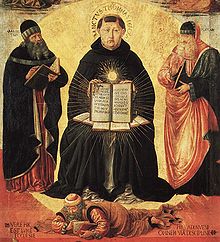
Back الخلاصة اللاهوتية Arabic Summa Teològica Catalan Summa theologiae Czech Summa Theologica Danish Summa theologica German Sumo Teologia Esperanto Suma teológica Spanish Teoloogia summa Estonian مدخل الهیات Persian Summa theologiae Finnish
 Page from an incunable edition of part II (Peter Schöffer, Mainz 1471) | |
| Author | Thomas Aquinas |
|---|---|
| Language | Latin |
| Subject | Christian theology |
| Publisher | Benziger Brothers Printers to the Holy Apostolic See |
Publication date | Unfinished at his death in 1274 |
Published in English | 1911 |
| 230.2 | |
| LC Class | BX1749 .T5 |
Original text | Summa Theologiae at Latin Wikisource |
| Translation | Summa Theologiae at Wikisource |
| Composed 1265–1274 | |
| Part of a series on |
| Thomas Aquinas |
|---|
 |
| Part of a series on |
| Scholasticism |
|---|
 |
The Summa Theologiae or Summa Theologica (transl. 'Summary of Theology'), often referred to simply as the Summa, is the best-known work of Thomas Aquinas (1225–1274), a scholastic theologian and Doctor of the Church. It is a compendium of all of the main theological teachings of the Catholic Church, intended to be an instructional guide for theology students, including seminarians and the literate laity. Presenting the reasoning for almost all points of Christian theology in the West, topics of the Summa follow the following cycle: God; Creation, Man; Man's purpose; Christ; the Sacraments; and back to God.
Although unfinished, it is "one of the classics of the history of philosophy and one of the most influential works of Western literature."[1] It remains Aquinas' "most perfect work, the fruit of his mature years, in which the thought of his whole life is condensed".[2]
Throughout the Summa, Aquinas cites Christian, Muslim, Hebrew, and Pagan sources, including, but not limited to: Christian Sacred Scripture, Aristotle, Augustine of Hippo, Avicenna, Averroes, Al-Ghazali, Boethius, John of Damascus, Paul the Apostle, Pseudo-Dionysius, Maimonides, Anselm of Canterbury, Plato, Cicero, and John Scotus Eriugena.
The Summa is a more-structured and expanded version of Aquinas's earlier Summa contra Gentiles, though the two were written for different purposes. The Summa Theologiae intended to explain the Christian faith to beginning theology students, whereas the Summa contra Gentiles, to explain the Christian faith and defend it in hostile situations, with arguments adapted to the intended circumstances of its use, each article refuting a certain belief or a specific heresy.[3]
Aquinas conceived the Summa specifically as a work suited to beginning students:
Quia Catholicae veritatis doctor non solum provectos debet instruere, sed ad eum pertinet etiam incipientes erudire, secundum illud apostoli I ad Corinth. III, tanquam parvulis in Christo, lac vobis potum dedi, non escam; propositum nostrae intentionis in hoc opere est, ea quae ad Christianam religionem pertinent, eo modo tradere, secundum quod congruit ad eruditionem incipientium |
Because a doctor of catholic truth ought not only to teach the proficient, but to him pertains also to instruct beginners. As the Apostle says in 1 Corinthians 3: 1–2, as to infants in Christ, I gave you milk to drink, not meat, our proposed intention in this work is to convey those things that pertain to the Christian religion, in a way that is fitting to the instruction of beginners. |
| —"Prooemium," Summa theologiae I, 1. |
It was while teaching at the Santa Sabina studium provinciale—the forerunner of the Santa Maria sopra Minerva studium generale and College of Saint Thomas, which in the 20th century would become the Pontifical University of Saint Thomas Aquinas, Angelicum—that Aquinas began to compose the Summa. He completed the Prima Pars ('first part') in its entirety and circulated it in Italy before departing to take up his second regency as professor at the University of Paris (1269–1272).[4]
Not only has the Summa Theologiae been one of the main intellectual inspirations for Thomistic philosophy, but it also had such a great influence on Dante Alighieri's Divine Comedy, that Dante's epic poem has been called "the Summa in verse".[5] Even today, both in Western and Eastern Catholic Churches, and the mainline Protestant denominations (Anglicanism, Lutheranism, Methodism, and Reformed Christianity), it is very common for the Summa Theologiae to be a major reference for those seeking ordination to the diaconate or priesthood, or for professed male or female religious life, or for laypersons studying philosophy and theology at the collegiate level.
- ^ Ross, James F. 2003. "Thomas Aquinas, 'Summa theologiae' (ca. 1273), Christian Wisdom Explained Philosophically." P. 165 in The Classics of Western Philosophy: A Reader's Guide, edited by J. J. E. Gracia, G. M. Reichberg, B. N. Schumacher. Oxford: Blackwell Publishing. ISBN 9780631236115.
- ^ Perrier, Joseph Louis. 1909. "The Revival of Scholastic Philosophy in the Nineteenth Century." New York: Columbia University Press. pg. 149.
- ^ Gilson, Etienne (1994). The Christian Philosophy of Saint Thomas Aquinas. Notre Dame, IN: University of Notre Dame Press. p. 502. ISBN 978-0-268-00801-7.
- ^ Torrell, Jean-Pierre. 1996. Saint Thomas Aquinas, vol 1, The Person and His Work, translated by Robert Royal. Catholic University. 146 ff.
- ^ Fordham University. Oct. 1921–June 1922. The Fordham Monthly 40:76.
© MMXXIII Rich X Search. We shall prevail. All rights reserved. Rich X Search